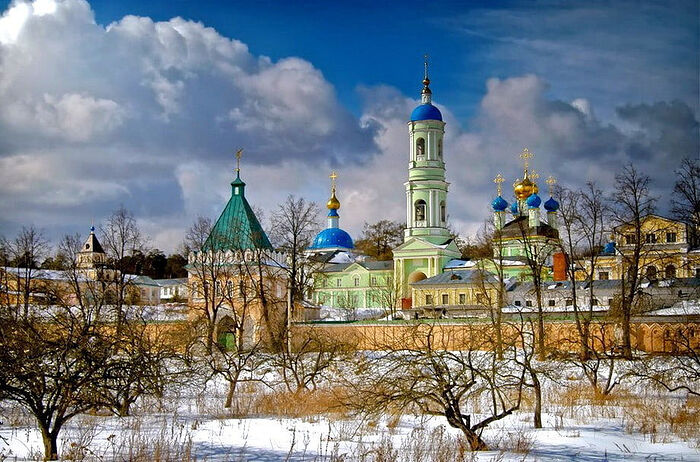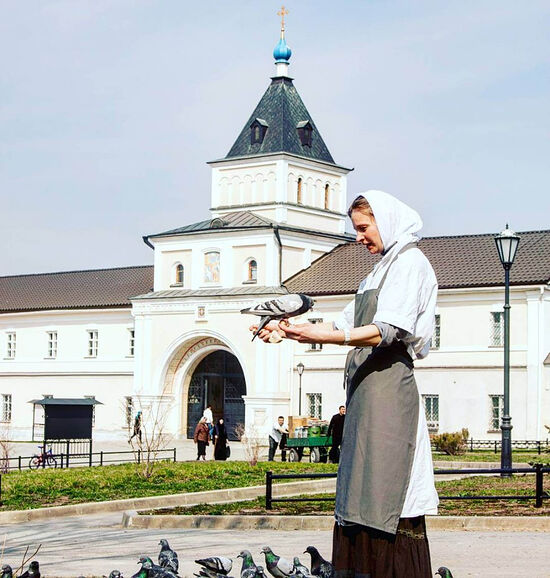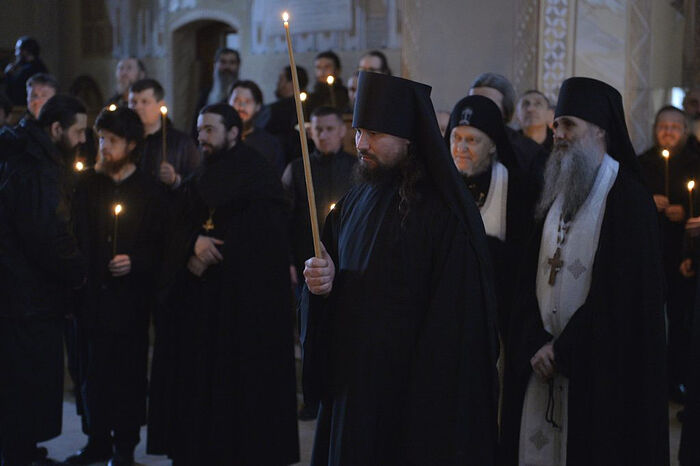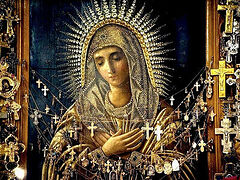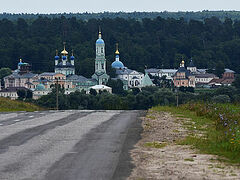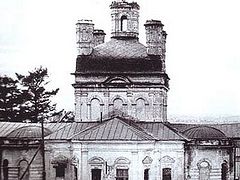We are not considered humble
when we only humiliate ourselves,
but when, having been humiliated by others,
we accept it without embarrassment,
as being worthy of it.
Likewise, our spiritual barrenness
must involuntarily reduce us
to the depths of humility,
and the passions that torment us
produce the same effect.
St. Macarius of Optina
“Where to next?” Fr. M. asked.
“To Optina.”
“We-e-e-ll, be ready. It’s no Pechory.1 Optina knows how to humble you.”
We exchanged glances, and suddenly I didn’t want to leave the Pskov Caves Monastery, so overflowing with love, where the monastic brotherhood, including the abbot, labored so harmoniously, saving others by their own example.
“Maybe we can stay?” I asked hesitantly.
“No, no,” Fr. M. hastened to answer. “Go with God.”
It was time to hit the road. We planned, in addition to the famous nineteenth-century monastery of the , to also visit Diveyevo, and the monasteries of Moscow and St. Petersburg.
And then there it was—Optina. They put us in a common barrack. The monastery was in the process of being restored, and at that time, they didn’t yet have the lovely, cozy guest houses they have now. But they had the most important thing—the churches, where the relics of the Optina fathers rested, and the Skete of St. John the Forerunner, where house of St. Ambrose of Optina was. Having read the books and life of Batiushka Ambrose, we had mentally visited the monastery many times. But dreams are dreams; the reality was quite another thing. We got there late, it was getting dark; the barracks were uncomfortable, the trapeza was gloomy; we had to sleep on the third tier of some wooden bunk, practically right under the ceiling. The person in charge in the barracks was gloomy and dissatisfied, although probably just tired. But I confess, after our sunny stay in Pechory, everything here seemed terribly gloomy.
Perhaps the trouble was in our modern, external work and our malformed, endless neophytism? Especially with us laity, who think that coming to God means the main thing is obedience and humility and that you have to start this work immediately. The more you humble those around you, the greater the reward awaits you in Heaven. Yesterday’s Komsomol members, communists, activists, having crossed the threshold of churches in the 90s, automatically became “experienced” Orthodox, actively taking up the cause of the salvation of the entire world, transferring their experience of working with the public. In this we saw the “fulfillment” of the commandments and our “Christian love” for God and neighbor. Our humility consisted of a “heavy burden” called “the salvation of mankind.” The titanic patience of the “saviors” consisted in the misunderstanding of our feat. By whom? By all of them—the wayward sheep of Christ’s flock. And if we couldn’t bear it, and even broke out in “righteous anger,” then of course, the “wisely shepherded, but bad sheep” were to blame.
The pilgrims who come to Optina certainly understood where they were. But, as happens with modern Christians, at home we often let loose, ready to humble our neighbors if necessary. But here you had to bite your glib tongues, donning a mask of reverent, albeit forced humility before the “teachers of obedience.”
Indeed, I didn’t last long. My fiery temperament began to make itself known, and my mask of imaginary piety soon started to crack. And it was sewn so shabbily that they almost immediately “caught” me at the doorstep, seeing my uncontrollable stubbornness. I couldn’t hide my disappointed expression, and I made a bad impression on the person responsible for the accommodations.
We were given an obedience the next day, and we were sent to wash the floors in the churches, flooded with such bright sunlight that the joy of being near the relics of the great saints completely erased yesterday’s dreary arrival. First was the Entrance of the Theotokos Church, where the relics are of the beloved Batiushka Ambrose, who taught us through books and also called us to obedience and humility before God and men with his gentle look from the icons. We washed the floors diligently and even joyfully. But alas, the problems with my temperament remained and they persist to this day. If someone wants to give me advice, they can always get a whole lecture in response to just one word or phrase, or rather, a tirade from me, so “well read.” Alas, I can be too big for my britches.
Next was the Kazan Church. Diligently waving a broom about, I managed to hit a lampada and drench myself and the wall under the Tikhvin Icon of the Mother of God with oil. Widening her eyes, instead of scolding me, the woman in charge of the cleaning whispered in surprise: “Well, the Most Pure One has marked you herself!” At that moment all I felt was fear. The wall was thoroughly soaked. Grabbing the first monk we came across, we fearfully awaited the verdict. But he sighed and said: “We’ll try to clean it later.” What else could he say? I still don’t understand how I managed to knock a lampada hanging so high. But the fact remained. There have been similar incidents before though, like a bull in a china shop.
And so the question arises: Why do some of our Church people believe that things like this are an indication of election from above? Believe me, there’s nothing like that, just the ensuing sorrows. Rather, such miracles are given to the weakest in faith to support them in future trials. It was the same after oil spilled on me from the lampada at the Crucifix in the Exaltation of the Cross Church. After the same thing happened in the Church of Blessed Ksenia, my marriage fell apart. When I overturned the lampada at the Tikhvin Icon of the Theotokos in Optina, before which people usually pray for their children, I was plunged into deep worries about my grandchildren. Is this what it means to be chosen? It’s the same with all miracles—myrrh-streaming, fragrances, icons being renewed.
In response to my questions about another miracle (and I confess, I’d begun to fear these questions) and the impending hardships, my spiritual father answered briefly, but comfortingly: “It’s for support, or rather, the strengthening of faith,” that is, to believe that everything is from God. Perhaps due to the pessimism genetically ingrained in me and the resulting despondency, I always easily lose my solid footing, and perhaps that’s the reason for such “support?” I don’t know, but I must admit that in recent years, I haven’t experienced any child-like delights at the sight of miracles. After the Tikhvin Icon streamed myrrh in my house, I almost completely fell away from Church life. This is a terrible thing, when we find ourselves becoming like Lot’s wife.
But back to our stay in Optina. At that moment, the woman in charge of obediences looked at me not only with surprise, but also with admiration. I even began to wonder if a halo had lit up over my head. But the oil-soaked wall halted my sarcasm. No one absolved me for my carelessness and sloppiness.
In the evening, news spread throughout the monastery that the Vladimir Icon of the Mother of God had come from Penza for one night. And the main detail: The icon is myrrh-streaming. We practically abandoned our obedience and rushed to the icon, persuading our “boss” along the way: “We’ll get everything done; we’re just going to venerate it; we’ll get absolutely everything done.” The poor woman was running around in bewilderment, weakly trying to protest. Apparently, the story with the spilled oil from earlier in the day had left her reluctant to argue with me. And so, with the sole desire of making it on time, we found ourselves standing behind some monks at the threshold of the Church of the Vladimir Icon.
The icon, bathed in light, lay on the analogion. It was beautiful. There was cotton at the bottom of the kiosk, already completely soaked with myrrh. The streams continued to flow down right before our eyes. Isn’t this a miracle of God’s mercy for us who live in the darkness of our passions and falls?
We often see ourselves as chosen when we encounter such phenomena, but we don’t suspect that myrrh on icons in churches and monasteries is like tears—tears shed for us, who have been lost to the faith for entire generations. That’s why there were so many miracles in the early twentieth century before the revolution, the civil war, repressions, World War II. History repeats itself. Now we’re mourned as incapable of the true Christian life. We have only to repent, but we’re incapable of it, managing to blame others for our troubles, mistakes, and falls, instead of ourselves—the only ones we love.
The next morning, we rushed to venerate the icon again, but the church was closed; the icon was already gone. A novice standing at the door asked,“Didn’t you make it yesterday?”
“Why,” we said smiling proudly, “of course we did.”
“So why did you come today?” he asked in surprise, and couldn’t resist another question:
“Aren’t you afraid of receiving so much Divine grace?”
Having looked at him with surprise, we exchanged glances, but he continued:
“After all, you’ll have to pay for everything in this life.”
There are no coincidences in this life: Whoever believes in them doesn’t believe in God. But we didn’t think about it then. Though we were in Optina for just two days, we encountered the Vladimir Icon that visited the monastery for just one night. And we crossed paths: in this monastery, in this slice of life, in eternity. Then life taught us more lessons; we made more mistakes, not understanding what the Queen of Heaven had prepared for us, wanting to protect us from falls, complaints, and sin.
When we returned to the barracks, we got a new obedience. The night before, I had expressed my dissatisfaction with the black sheets. Times were tough. There weren’t enough sponsors to restore the monastery economy; the main priority was restoring the churches. There were few workers, but many pilgrims came. And here I was, insisting on white sheets. So they sent me to work in the laundry. Yes, I deserved it because of my grumbling. My friend felt bad for me. We spent the whole day in the laundry, knee-deep in water, washing those very sheets. But apparently that lesson wasn’t enough for me. Laying down to sleep in the evening on my three-story bed, I suddenly saw an icon of the Mother of God the Healer on the wall at the head of the bed. “What a weird idea!” I exclaimed. “Icons belong on an iconostasis, not next to beds.” I finished my thought aloud, and tearing off the icon, I took it to the prayer corner.
I had barely fallen into a deep sleep from exhaustion when suddenly it began. An unbearable pain shot through my joints. I wasn’t able to sleep the whole night. And stretching out my arms and legs, I prevented my bunkmate from getting rest. I barely made it to morning, when I rushed to the infirmary to get some aspirin. But it was closed, and I had to leave the monastery to go look for a pharmacy. And again, while it served me right, my companion, not wanting to stay without me, even though I assured her I would wait for her in Moscow, gathered her things in distress, and soon we were at the bus station. When you receive a well-deserved reprimand from above—thank God, but when an innocent person suffers alongside you, you begin to burn with double shame.
Optina is a good place for lessons in humility. Fr. M., having begun his monastic path there at Optina, knew what he was warning us about. And for me, the well-known saying, “You don’t bring your own typikon to someone else’s monastery,” took on its own shape there and gave me a valuable experience.
The woman in charge in the barracks did eventually ask for forgiveness and even explained why. The spiritual father of the monastery, Fr. Iliy, insisted. However, for some reason she asked for forgiveness from my companion standing in front of her, unlike me, who hadn’t disturbed her inner peace in any way. But it seems I was too distant and unapproachable. I was sitting on my third bunk, hanging down like a hen on its perch. While rejoicing at her arrival and unable to get down quickly, I echoed the familiar words after her: “You forgive us, and we forgive you, and may God forgive us all.”

